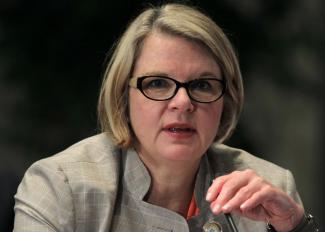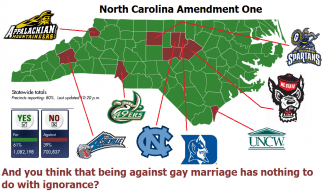So your college just elected a racist as its next president. Would that make national news? Would that upset a majority of the institution's employees? What if they elected and anti-semite to be the leader of your college? This might make some national news. But when it's the former Secretary of Education of the United States and she has a history of being anti-LGBT and doesn't apologize for it, that's okay, right?
In a recent article by Mark Joseph Stern entitled The University of North Carolina’s New President Is Shockingly Anti-Gay, he tells us a little more about the UNC's new leader.
When Republicans gained supermajorities in both houses of the North Carolina legislature in 2012, they stacked the University of North Carolina System Board of Governors with extremely partisan, conservative appointees. Those appointments paid off for the GOP: The board fired the UNC system’s left-leaning president and, last Friday, elected Margaret Spellings to replace him. Spellings served as secretary of education under President George W. Bush. During her earliest days in office there, she was responsible for perhaps the decade’s most galling act of homophobic censorship.
The Senate confirmed Spellings on Jan. 20, 2005. Just days later, in her first official act as secretary, she penned a shocking letter to PBS, which had produced an episode of the children’s program Postcards From Buster featuring same-sex parents. In the episode, the titular Buster—an anthropomorphic rabbit who travels around North America experiencing different cultures and customs—visits Vermont to learn about maple syrup. He meets children with two moms who are presumably in civil unions. One child says she has a “mom and stepmom” and that she loves her stepmom very much. That is the extent of the episode’s gay content.
This fleeting encounter with same-sex parents made Spellings furious. In her letter to the network, Spellings declared:
Many parents would not want their young children exposed to the lifestyles portrayed in the episode. Congress’ and the Department’s purpose in funding this programming certainly was not to introduce this kind of subject matter to children, particularly through the powerful and intimate medium of television.
Spellings reminded PBS that some (though not all) of the funds used to produce the program came from the government. She asked the network to return the money used to produce the Vermont episode and to strip any reference to the Department of Education from the show or its promotional materials. She also demanded that PBS notify member stations of the episode’s same-sex content so they could elect not to air it.
Finally, Spellings noted that “you can be assured that in the future the department will be more clear as to its expectations for any future programming that it funds.” But how could she be “more clear”? The message of the letter is obvious: Depict another same-sex couple, and I’ll pull your funding. PBS decided not to distribute the episode, though some brave stations still chose to air it. Meanwhile, gay families across the country learned just how deeply their government despised them. It is difficult to think of a more effective way to stigmatize same-sex parents and their children than to tell them that their mere existence is too deviant to acknowledge on public television.
Spellings had a chance to apologize for this incident at a press conference after her election on Friday. Instead, she dug herself deeper. When asked about the letter, she said, “I have no comments about those lifestyles.” Of course, this kind of phrasing is itself troublingly homophobic, implying that homosexuality is a choice rather than an identity—and a bad choice at that, one centered around immoral actions.
On Tuesday, I asked Chris Sgro, executive director of the LGBT rights group Equality North Carolina, for his read on Spellings. He sounded nervous.
“The fact that she felt like she could use the word lifestyles after what she did around PBS is really problematic to us,” Sgro told me. But Equality North Carolina is equally concerned abut the board of governors’ broader move “to conservatize the university system” through “an attack on the academic side,” cutting programs like women’s and gender studies.
I asked Sgro where, on a scale of 1 to 10, he would rate his concern about the negative impact of Spellings’ appointment on the lives of LGBT university students.
“An 8,” he said with a laugh. But he wasn’t joking. – slate.com
What happened UNC? Did you lose something called integrity? Are you not a beacon of intelligence in a state that has a recent history of needing beacons? In 2012, the red counties of NC were the only ones in the state to vote down Senate Bill 514 is: "An Act to Amend the Constitution to Provide That Marriage Between One Man and One Woman is the Only Domestic Legal Union That Shall Be Valid or Recognized in This State." As you can see in the map, the only states to vote down the amendment were ones that contained a college or university.
Now granted, the president of a college / university most of the time is just a figure head, but as the former Secretary of Education for the U.S., I feel Spellings will do more than just keep the president's seat warm until the next one is elected.
Why isn't there more about anti-LGBT Spellings taking over as UNC President?
Is anti-LGBT an easy thing to overlook when the candidate brings so much more to the table?
What if they were an anti-semite or racist?



